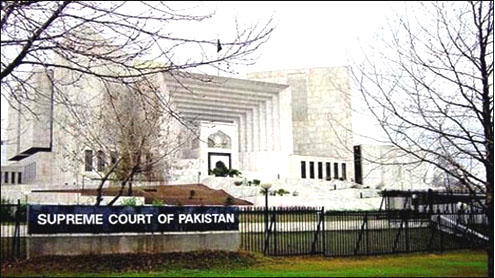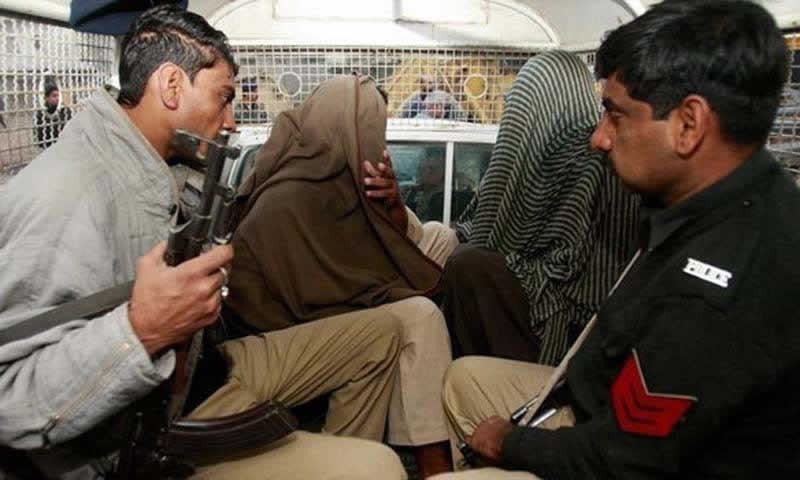 ISLAMABAD: Failing to show due reverence to the Supreme Court of Pakistan’s order on preparation of electoral rolls by February 23 and seemingly joining hands with pro-government political forces to defy the court’s instructions, the Election Commission of Pakistan said on Monday that voter lists could not be completed by the deadline and staying the by-polls by the SC was unconstitutional.
ISLAMABAD: Failing to show due reverence to the Supreme Court of Pakistan’s order on preparation of electoral rolls by February 23 and seemingly joining hands with pro-government political forces to defy the court’s instructions, the Election Commission of Pakistan said on Monday that voter lists could not be completed by the deadline and staying the by-polls by the SC was unconstitutional.
Responding to the statement given by the ECP, the Supreme Court declared that remarks were not based on facts.The Monday’s consultative meeting of political parties with the EC management held on the pretext of discussing the preparation of new electoral rolls, by-polls, political finance and purchasing Electoral Voting Machines (EVMs) appeared defying the SC instructions. The Chief Election Commissioner Justice (r) Hamid Ali Mirza repeatedly and Secretary Election Commission Ishtiak Ahmed Khan impliedly resorted to the language that clearly amounted to outright contempt of the SC.
The ECP management expressed inability to prepare the Electoral Rolls 2011 by February 23 and announced to complete the task by May 25, despite that SC had turned down the ECP request to extend the deadline. Justice Mirza, who himself remained a senior judge of the SC, seemed overlooking to uphold the Apex Court’s dignity when he termed the SC decision of barring the ECP from holding by-polls on existing voter lists as ‘unconstitutional’. “This is an unconstitutional step. The Election Commission of Pakistan is an independent body and is completely autonomous in taking any decision regarding electoral rolls. Every organ of the state should act within its limits,” he said while chairing the consultative meeting.
Ishtiak Ahmed Khan, who is on two-year extension after retirement, went too far and said that ECP was “As important as Supreme Court, as independent and respectable as SC and people and political parties stood by the ECP the same way they stand by the apex court.” Khan, however, did not elaborate as on what grounds he drew a comparison between Pakistan’s highest and the most esteemed judicial organ with an electoral body.
Ishtiak Khan claimed that 11 of the 14 political forces were ‘supporting’ the ECP in its decision to prepare ER 2011 by May 25. One the other hand, he conceded that Pakistan Muslim League-Nawaz, Pakistan Tehreek-e-Insaf and Jamat-e-Islami were opposing any delay in the preparation of ER 2011. With the exception to a few mainstream parties, majority of the 11 parties that ‘support’ ECP comprises smaller political groups that lack any significant say in political arena. On the other hand, the categorical opposition from PML-N, the second largest parliamentary force and PTI, the fastest growing party against ECP’s negligence suggests that significant political circles want ECP to live up to its claims regarding new electoral rolls and obey SC instructions without dillydallying.
Talking to TheNation by phone, the Jamiat Ulema-e-Islam-Fazl Chief Maulana Fazlur Rehman clarified that his party did not offer any support to ECP. Rather, he said, the JUI-F only supported the preparation of flawless ER 2011, sooner than later. “I never said ECP did a remarkable job by showing negligence in preparing ER 2011 in time. We simply want transparent elections.” Asked if he supported administrative action against the ECP officials responsible for delay in new electoral rolls, Fazl said, “If found guilty, they must be proceeded against. The related case is in the SC and it’s up to the learned court to decide about their fate. We would fully respect court’s decision.”
Earlier, the JUI-F chief told the media that his party supported snap polls than earliest possible elections. “Snap polls is a feasible option,” he said.Senior PML-N leader Iqbal Zafar Jhagra asked ECP to explain why it failed to meet the February 23 deadline despite that it repeatedly claimed to prepare ER 2011 by December last year or by February 2012, at the latest. Pakistan Muslim League Quaid-e-Azam Chief Chaudhry Shujaat Hussain supported ECP stance on delay in electoral rolls.
During a related hearing on January 12, the apex court had rejected ECP’s excuse that delay in ER 2011 was due to ‘mega’ floods in Sindh (only six districts were affected), dengue fever in Punjab (only Lahore was affected) and military operations in north-western tribal areas (military operations are underway only in Bara and Orakzai Agency). Considering that ECP had made big claims last year to get ER 2011 prepared by December, the apex court barred holding seven by-elections scheduled on the coming February 20 on the existing suspicious voter lists.
Meanwhile, the secretary ECP said, without elaborating, “Important” steps were taken on political finance and right to vote for overseas Pakistanis. He said ECP would take up the issue of local government polls after Senate elections, that, Khan said, required legislation. He said, general elections would be held on existing constituencies and modalities for buying EVMs were “finalised” Responding quickly the Supreme Court said on Monday that an erroneous impression had been created during the meeting of the Chief Election Commissioner with the political parties as well as statement of the Secretary, Election Commission of Pakistan that as if the Supreme Court had stayed the holding of bye-election on casual vacancies in the country.
Supreme Court statement said in the order of 19th January 2012 the Court had directed the ECP not to hold bye-election on the basis of polluted/un-verified voters list, after deleting 37, 185, 998 un-verified voters by the Nadra as per their statement before the Supreme Court dated 4th of July, 2011 in the case of Imran Khan petition.The court order added that the ultimate focus should be on verified/valid electoral list in order to meet the requirement of the Constitution under Article 218 (3) which stipulates that the election should be conducted honestly, fairly and justly in accordance with the law.
It is further clarified that election on the basis of polluted/un-verified voter list cannot be termed as just, fair and in accordance with law, as required under Article 218(3) of the Constitution. The Election Commission is free to hold bye-elections subject to what has been observed by the Supreme Court in the above order.












